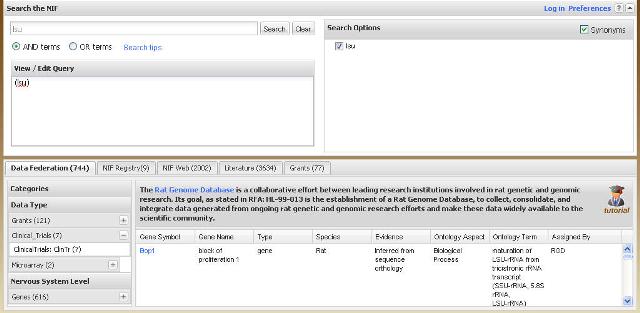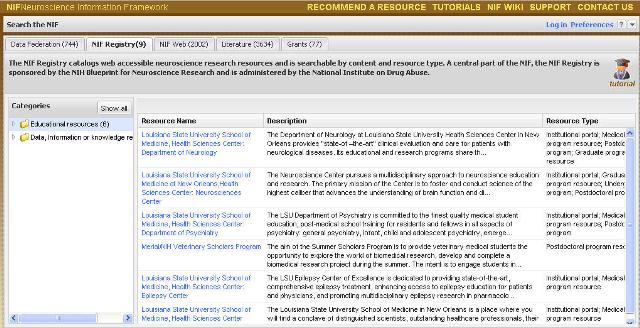
There’s a new, free portal to neuroscience information from the NIH called NIF: Neuroscience Information Framework.
NIF is a free, web-based, portal to a wide variety of neuroscience-relevant resources, funded by the National Institutes of Health. We have an extensive registry of over 2500 resources along with a custom web index and literature archive. Through the NIF Data Federation, we provide a direct query of over 40 databases, with new ones being added regularly.
Type a key word on the homepage to see find information about NIH grants, projects, neuroscience tools, and biomedical literature. A search for LSU gives search results from a variety of sources, from grants to clinical trials, even gene info. Other tabs link to web resources and literature from Pubmed.

The NIF registry is a useful way to locate neuroscience research resources from a network curated by the NIH. The Registry could be a starting point to find jobs, mentoring and educational opportunities in the neurosciences.

You can also recommend neuroscience resources such as materials, training, software, funding, services, data, jobs or people.
The Librarian’s Review:The search results screen can seem a little overwhelming, but clicking on the arrow by ‘log in preferences’ will make the search box disappear. If you’re used to using Excel, the NIF search result interface is similar. Categories can be sorted or removed to customize the view, and results can be exported, which is useful if you want to put them into Refworks or Endnote. Abstracts appear if you hover your mouse too long over the field, which can get annoying when trying to scan results.
Overall, NIF is a useful portal, acting as a clearinghouse for a number of different to resources, tools, grants and programs in neuroscience. The interface is fairly simple to use, though first time users might get overwhelmed by the amount of information available. It’s a good attempt to make a useful, curated portal for a specialty. Would like to see more of this.
NIF: Neuroscience Information Framework
http://www.neuinfo.org/
also available under our online resources

 myLSUHSC
myLSUHSC



